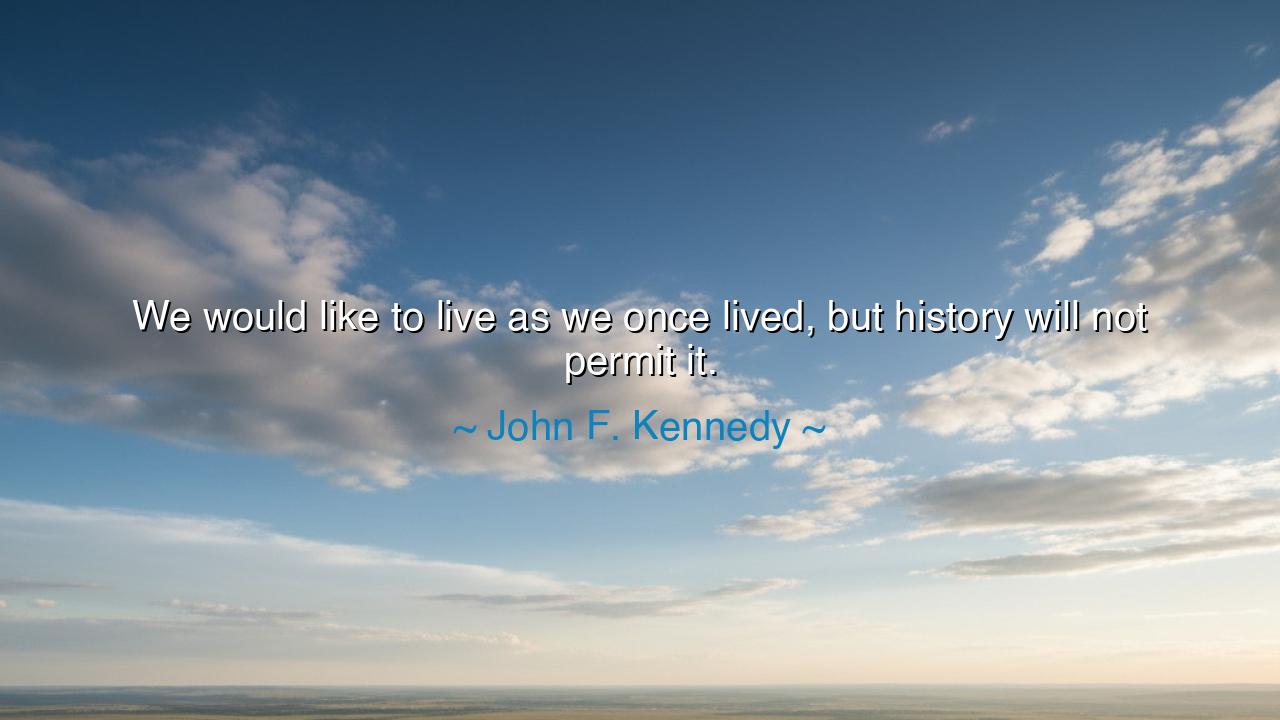
We would like to live as we once lived, but history will not






“We would like to live as we once lived, but history will not permit it.” Thus spoke John F. Kennedy, the youthful President of the United States whose words, like arrows of clarity, pierced the illusions of comfort and nostalgia. In this brief but thunderous statement, Kennedy captured the essence of humanity’s eternal struggle between longing for the past and accepting the demands of the present. His voice, calm yet prophetic, warned that history is not a river that flows backward, and that those who try to dwell in what once was will find themselves drowned by the tide of what is to come.
The origin of this quote lies in a speech Kennedy delivered in 1962, during a time of great global tension — the Cold War, when the world teetered between hope and annihilation. The old world, the world of clear borders and simple alliances, had crumbled. The atomic age had dawned, and humanity, for the first time, held in its hands the power to destroy itself. Kennedy’s words were not merely about politics; they were about destiny. He spoke as a man who understood that each generation is summoned to live differently than the one before it, and that yearning for the old ways — the safer, slower ways — was futile in an age of transformation.
When he said, “We would like to live as we once lived,” Kennedy gave voice to a universal human desire — the longing for the familiar, for peace after struggle, for the simple joys untroubled by the weight of responsibility. But when he added, “history will not permit it,” he reminded us that time itself forbids stagnation. Change is not cruelty; it is necessity. History is the stern teacher that drags us forward whether we wish it or not. For nations, as for souls, there comes a moment when retreat is impossible, when the only path lies through trial. Kennedy understood this truth as deeply as any ancient philosopher — that comfort breeds complacency, and complacency, in the long arc of civilization, leads to decay.
Consider the world that surrounded him. The United States, victorious in World War II, now faced new uncertainties — nuclear rivalry with the Soviet Union, the struggle for civil rights at home, and the rising tide of decolonization abroad. Many longed for the clarity of the past, when enemies were visible and faith in progress unshaken. Yet Kennedy, like a statesman forged by history’s fire, knew that the world had irrevocably changed. “We cannot escape our destiny,” he seemed to say. “The mantle of leadership, of moral responsibility, is ours — and to wear it, we must grow beyond what we were.” His was not the voice of resignation, but of awakening — the call to meet the future not with fear, but with courage and adaptation.
This truth, though spoken in an age of nuclear standoff, extends to all times. Every era faces its own crossroads, every people its own transformation. The ancient Greeks, who once gloried in the age of Pericles, could not halt the winds of empire that swept them away. The Romans, too, longed for the simplicity of the Republic even as they crowned emperors in its ruins. And in our own lives, how often do we look backward — to youth, to lost innocence, to the way things “used to be” — hoping that time might bend to our desires? Yet life, like history, grants no return. The past is not a place one may live in; it is a teacher whose lessons prepare us for the uncharted lands ahead.
Kennedy’s insight is thus both heroic and humbling. He reminds us that greatness is born in the acceptance of responsibility — that to live as we “once lived” is to deny the calling of our time. Change, though painful, is the forge of progress. History, though unyielding, is not cruel to those who heed its lessons. To resist its movement is to break upon it; to walk with it is to shape it. As he himself embodied through his presidency, the task of every generation is to face the challenges unique to its hour — to take the torch passed from the past and carry it, burning brighter, into the uncertain future.
So, my children, take this teaching to heart. Do not cling to what was, but rise to what must be. The world changes because it must, and so must you. When the past calls you to stay, remember that it is but an echo; the living voice of purpose speaks only in the present. To long for the old ways is natural, but to remain there is to be left behind. Instead, honor the past by fulfilling its promise — by shaping the future it dreamed of. For as Kennedy knew, history does not permit stillness, but it rewards those who meet its demands with wisdom, courage, and will.
And thus, his words endure across the ages — not as lamentation, but as invitation: to live fully in the world as it is, to embrace the destiny that time has given us, and to believe, even when the path is dark, that in walking forward we serve the eternal march of humanity itself.






AAdministratorAdministrator
Welcome, honored guests. Please leave a comment, we will respond soon